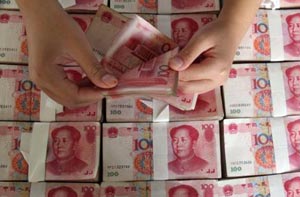
SHANGHAI - Measures to direct and regulate private fundraising, including the launch of a trial service center to register transactions, have been released by the municipal government in Wenzhou, Zhejiang province.
According to an official document from the Wenzhou government, all concerned departments must cooperate to prevent illegal fundraising activity and protect the interests of private lenders.
"We submitted draft measures to the municipal government in early December, with advice to regulate the operation of the private lending market and control the risks of private lending," said Ye Xinming, deputy director of the city's financial office.
Many businesses in Wenzhou had liquidity problems in recent months because of the country's tightening economic policies and the slowdown in global markets.
The city's huge underground banking industry nearly collapsed after more than 90 companies closed, and several suicides by business owners took place since September.
"Most private lenders have been forced to stay out of the market for more than three months, and we are waiting for the repayment of some high-interest loans from borrowers," said Wang Jianxiao, a private money collector in Wenzhou.
To help small and medium-sized enterprises (SMEs) get funding and underwriting companies get authorization to operate, the document said that a trial service center would be established.
The center would offer advice on the legal conduct of private lending. It would also advise SMEs on available loans with controlled risks.
Those in the private lending sector such as Wang don't think these government steps will affect them much in the near term, as they face their toughest times.
"We're quite desperate with the current situation in the private money market and underground banking system, as no one wants to lend to SMEs, which might not repay loans on time," said Wang.
Authorized small-scale lenders have benefited from the crackdown on illegal private lending, and they look forward to a more regulated credit system in the city.
"The number of loans we offered to SMEs has doubled in the past three months, when private loan collectors didn't want to lend large amounts of money to high-risk enterprises," said Fu Jiarong, manager of the Wenzhou Jiexin Small-Sum Loan Co.
Fu said the local government's new measures and policies would soon improve the situation for authorized loan companies by providing a better risk control monitoring system.
The new measures aim to curtail private loan activity. All such transactions will be fully registered and cases involving large amounts will receive tighter monitoring.
"The new measures taken by Wenzhou could be a short-term fix for the sudden breakdown of the underground banking system, but they probably won't improve the entire financial system in the longer term," said Liu Shengjun, deputy director of the Lujiazui International Finance Research Center at the China Europe International Business School.
Liu suggested that getting SMEs into the financial system with fewer restrictions and having them get more bank loans at reasonable interest rates would probably do more to help both SMEs and private lenders.
 A workshop of Sany Heavy Industry Co in Changsha
A workshop of Sany Heavy Industry Co in Changsha
 A Dongfeng Nissan car at the Guangzhou Auto Show 2012
A Dongfeng Nissan car at the Guangzhou Auto Show 2012
 Rural grid upgrades to ensure electricity
Rural grid upgrades to ensure electricity
 Xiamen Airlines joins SkyTeam
Xiamen Airlines joins SkyTeam
 Divorce pushes female tycoon from top spot
Divorce pushes female tycoon from top spot
 New career, new dream
New career, new dream
 Hengyuanxiang becomes official partner of COC
Hengyuanxiang becomes official partner of COC
 A more global yuan
A more global yuan